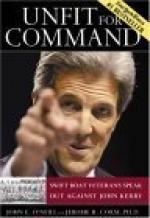
|
| Name: _________________________ | Period: ___________________ |
This test consists of 5 multiple choice questions, 5 short answer questions, and 10 short essay questions.
Multiple Choice Questions
1. How does Kerry portray himself in his book's account of Ponder's injury?
(a) As an innocent bystander.
(b) As a hero.
(c) As a witness.
(d) As a victim.
2. Which one of the following does Hoffman question about Kerry in the Introduction?
(a) His judgment.
(b) His patriotism.
(c) His political agenda.
(d) His authority.
3. What was the title of Kerry's book?
(a) Tour of Duty.
(b) The Necessity of War.
(c) Life at War.
(d) Reporting for Duty.
4. Which one of the following does Hoffman feel is doubtful in Kerry?
(a) His political ambitions.
(b) His loyalty.
(c) His ethics.
(d) His citizenship.
5. Were the Swift Boat Veterans surprised by Kerry's actions at the Swift Boat Veterans Reunion?
(a) Over half were not sure.
(b) Over half were.
(c) No.
(d) Yes.
Short Answer Questions
1. What does the open letter from the Swiftees label Kerry?
2. What does Hoffman believe Kerry is unfit for?
3. How many signatures were on the open letter to Kerry from the Swiftees?
4. Who is recognized along with Kerry in the "War Heroes" exhibit?
5. How many of Kerry's commanders signed the open letter from the Swiftees?
Short Essay Questions
1. What inspired O'Neill and the other Swiftees to contact Kerry with regards to his actions in Vietnam and after the war was over?
2. What does the quote from John Edwards say and why is it so effective?
3. How is Lupetti's observation in Vietnam relevant to Kerry and the ideas about him that the book outlines?
4. What is the purpose of the open letter the Swift Boat Veterans issue to John Kerry?
5. What is the reaction of Kerry at the Swift Boats Veterans Reunion in 2003 and why is it significant?
6. Who is Roy F. Hoffman and why is his opinion regarded so highly?
7. What are Hoffman's thoughts about Kerry, and why do the authors choose to begin the book with his quote?
8. Why do the authors make it a point to mention that their purpose for writing the book is not political?
9. What is the reason the authors do not use the word, "President", instead, referring to the position as the "Commander in Chief"?
10. What is significant about the location of Lupetti's observation and who was responsible for it?
|
This section contains 1,004 words (approx. 4 pages at 300 words per page) |

|




